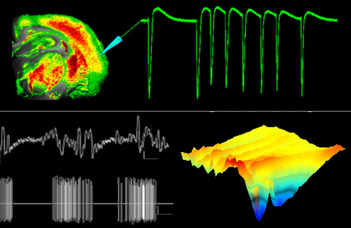
Department of Physiology and Neurobiology
| head of dept.: address: room: phone: fax: web page: |
Katalin Schlett assoc. professor 1117 Budapest, Pázmány Péter sétány 1/C., 6.4 (+36-1) 381-2181; (+36-1) 372-2500 /8081 (+36-1) 381-2182 neuroscience.elte.hu |
|
Description of the research field
Neurobiological research has prominent traditions in Hungary, several eminent scientists took part already in pioneering neurobiological experiments. The research field is broad, there are still many exciting unanswered questions from elucidating the molecular basis of memory to the research of artificial intelligence, or discovering therapeutic approaches for nervous system disorders. Research in our Department is carried out in the different fields of neuroscience and neurobiology; research interest extends from histological, membrane biophysical analysis of cellular processes to the behavior of animals. In addition to basic theoretical questions, important practical research is also being carried out at the Department. Education The teaching of Physiology as an independent subject at universities began about 50 years ago. The Faculty of Science of ELTE was among the first faculties where a separate department was established for the teaching of this discipline. Currently, our educational activity covers the whole area of animal physiology, among others the circulatory, respiratory, secretory system and the functioning of the gastrointestinal tract are discussed. Particular emphasis is placed on the teaching of human regulatory functions. Teachers of the Department consider it important that, in addition to theoretical knowledge, future biology teachers and researchers familiarize themselves with the practical application of modern experimental tools. On the Master level, students can learn about different areas of neuroscience and acquire basic knowledge about the structure and functioning of the nervous system. Our educators are investing a lot of work in order to provide students with the adequate, modern educational demonstration material for both practical and theoretical lessons. Research Remarkable progress has been made in recent decades towards understanding the structure and functioning of the nervous system. However, due to the lengthening of human life and the acceleration of lifestyle, the appearance of diseases affecting the nervous function can also be observed. In addition to individual problems, these represent a significant socio-economic burden. Exploring the normal nervous system function, behavior and the underlying cellular processes can provide solutions to many unanswered questions. By using different experimental methods, these studies have a great tradition in our department. Experimental work is currently organized into four research groups:
The funding of research work is provided by the National Research and Development and Innovation Office, the Hungarian Academy of Sciences and the European Union. Significant collaborations have also been made between laboratories, but domestic and foreign co-operation outside the Department is also being implemented. Each year, 15-20 scientific publications are published at the Department, which appear in noted journals of the field. Life at the Department In addition to Biology students, we also offer relevant research topics for students in Environmental sciences, Bioinformatics, Biophysics and Medicine. Taking advantage of the ERASMUS program or other scholarships, students regularly arrive from many European countries or from other parts of the world, and participate in research at the Department and prepare their thesis. At our Department, basic Physiology lectures and practicals are held also in English; and the students attending Master's programs can choose between Hungarian- and English-language courses. This gives an opportunity to our graduates to get involved into international scientific life without difficulties. Teachers at the Department also promote talent management and scientific dissemination; we regularly participate at several such programs. Career opportunities Students who obtain a Master's or PhD degree at the Department of Physiology and Neurobiology are mainly involved in the field of neuroscience. Nervous system research is internationally recognized, but it is also highly supported in Hungary; research concerning the structure of the brain and normal or abnormal functioning of the nervous system is important both from the theoretical and practical point of view. Accordingly, our students are mostly involved in basic research at the academic sphere, in domestic or foreign research institutes, but many start a career at companies dealing with drug research or other healthcare research. How to become a neurobiologist? Students interested in natural sciences should apply for ELTE Biology Bachelor's Degree (BSc). In addition to obtaining compulsory physiological knowledge, the student may already take up special neurobiological subjects during the initial training course, where he or she can get to know theoretical neurobiological problems and experimental techniques. An ambitious, committed student can join the research work at the Department or join a team of neurobiological investigators at a number of other research institutes with the assistance of a departmental consultant. By engaging in lab experiments, the students may achieve an academic student thesis (TDK – Scientific Student Association). At the MSc level, it is recommended to choose the Neuroscience-Human Biology specialization, where faculty members and external specialists can provide deeper knowledge in different areas of neurobiology. In the framework of the Biology Doctoral School, the student interested in the field of neuroscience may complete a four-year training program at the Neurobiology and Human Biology subprogram and gain a PhD degree. Excellent research work carried out during the university years with persistence, enthusiasm and self-sufficiency, coupled with good English language skills, is a guarantee for further successful work in the chosen discipline. Contact by e-mail the group leader of the lab the topic of which have challenged you. You can find the e-mail addresses on the own homepage of the department. |

